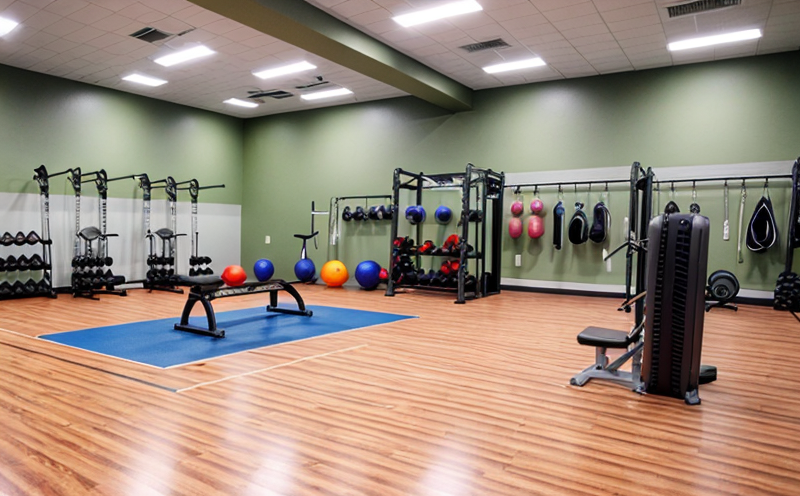First Heading
Mechanical Strength Testing of Sporting Goods: Ensuring durability and safety in every product.
In the realm of consumer products, especially within sporting goods and fitness equipment, mechanical strength testing is a critical component. This service ensures that each piece undergoes rigorous assessment to meet stringent quality standards. Mechanical strength tests are designed to simulate real-world conditions under which products may be subjected to stress or force.
For instance, in the case of bicycles, our laboratory can test components like frames and wheels to ensure they withstand the maximum weight and torque that users might apply during intense cycling sessions. Similarly, for athletic footwear, we assess how well the sole adheres to the upper material under various pressure points. These tests are not just about identifying weaknesses; they help in enhancing product design by highlighting areas where improvements can be made.
The importance of mechanical strength testing cannot be overstated. It plays a pivotal role in safeguarding consumer health and safety, especially when dealing with high-impact sports equipment such as helmets or protective gear used in contact sports like hockey or football. By adhering to international standards such as ASTM F963 for toy safety and ISO 10852 for skateboards and scooters, we ensure that our clients meet regulatory requirements while also enhancing brand reputation.
Our approach goes beyond mere compliance; it involves continuous innovation through advanced testing methodologies. For example, we use sophisticated machine equipment capable of simulating dynamic loads on materials to evaluate their resilience against repeated impacts or vibrations. This capability allows us to identify potential failure points early in the product lifecycle, enabling manufacturers to refine designs before mass production begins.
To summarize, mechanical strength testing serves multiple purposes: it protects consumers by preventing accidents caused by defective products; it supports brand integrity by demonstrating commitment to excellence; and finally, it fosters trust among stakeholders who rely on reliable, robust sporting goods. Whether you're developing new products or refining existing ones, our laboratory offers comprehensive solutions tailored specifically for the unique needs of this sector.
Quality and Reliability Assurance
The quality and reliability assurance that comes with mechanical strength testing are paramount in maintaining consumer trust. Our rigorous testing process ensures not only compliance with industry standards but also exceeds expectations by providing data-backed insights into product performance.
When it comes to sporting goods, ensuring durability is crucial for both safety reasons and customer satisfaction. By subjecting these products to simulated real-life scenarios, we can pinpoint exactly where strengths lie and where improvements are needed. For example, a running shoe might need better cushioning in the heel area based on test results indicating excessive wear there during long-distance runs.
Our tests go beyond just identifying flaws; they also offer valuable feedback that guides product development decisions. Manufacturers can use this information to enhance design features like shock absorption or weight distribution, thereby creating more efficient and effective products. Additionally, our expertise in interpreting test results helps clients understand the implications of different material choices or manufacturing processes on overall performance.
It’s worth noting that our laboratory adheres strictly to recognized international standards such as ISO 10852 for skateboards and scooters, ASTM F963 for toy safety, and others relevant to specific categories within consumer products. Compliance with these norms ensures not only legal adherence but also enhances the reputation of brands operating globally.
Moreover, our commitment extends beyond just testing; we provide detailed reports that outline findings comprehensively. These documents serve as essential references for further development or improvements where necessary. They also aid in addressing any concerns raised by regulatory bodies or customers regarding product quality and reliability.
Customer Impact and Satisfaction
The impact of mechanical strength testing on customer satisfaction cannot be underestimated. By ensuring that sporting goods meet robust standards, we significantly enhance user experience and confidence in the products they purchase.
For consumers, knowing their equipment has undergone thorough evaluation instills a sense of security. This is particularly important for high-risk activities where proper gear can mean the difference between minor discomfort and severe injury. For instance, skiers might feel safer wearing goggles that have passed rigorous impact resistance tests. Similarly, cyclists would trust helmets that demonstrate excellent protection against impacts.
From a broader perspective, satisfied customers translate into increased brand loyalty and repeat business opportunities for manufacturers. Positive experiences with reliable sporting goods encourage consumers to recommend them to friends and family members, fostering word-of-mouth marketing which is invaluable in competitive markets.
Manufacturers who invest in quality assurance through mechanical strength testing also benefit from reduced warranty claims and returns. Products that pass rigorous tests are less likely to fail prematurely due to manufacturing defects or poor design choices. This reduces costs associated with replacing defective items, improving profitability for the business.
Beyond immediate benefits like cost savings and enhanced reputation, there’s an intangible value in knowing one is contributing positively towards public safety. By setting high standards for mechanical strength testing, we help create safer environments where people can enjoy their preferred activities without fear of accidents or injuries caused by substandard equipment.
Environmental and Sustainability Contributions
- Eco-friendly Testing Methods: We employ eco-conscious practices in our testing procedures, minimizing waste generation and resource consumption.
- Energy Efficiency: Our laboratory utilizes energy-efficient equipment that reduces operational carbon footprints.
- Sustainable Materials Utilization: We advocate for the use of sustainable materials where possible during specimen preparation to minimize environmental impact.





